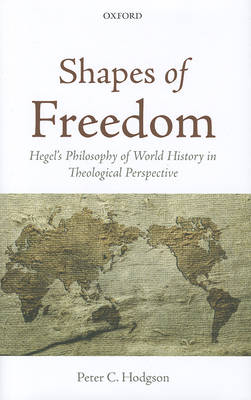
- Retrait gratuit dans votre magasin Club
- 7.000.000 titres dans notre catalogue
- Payer en toute sécurité
- Toujours un magasin près de chez vous
- Retrait gratuit dans votre magasin Club
- 7.000.0000 titres dans notre catalogue
- Payer en toute sécurité
- Toujours un magasin près de chez vous
Shapes of Freedom
Hegel's Philosophy of World History in Theological Perspective
Peter C Hodgson
Livre relié | Anglais
193,45 €
+ 386 points
Description
Peter C. Hodgson explores Hegel's bold vision of history as the progress of the consciousness of freedom. Following an introductory chapter on the textual sources, the key categories, and the modes of writing history that Hegel distinguishes, Hodgson presents a new interpretation of Hegel's conception of freedom. Freedom is not simply a human production, but takes shape through the interweaving of the divine idea and human passions, and such freedom defines the purpose of historical events in the midst of apparent chaos. Freedom is also a process that unfolds through stages of historical/cultural development and is oriented to an end that occurs within history (the 'kingdom of freedom'). The purpose and the process of history are tragic, however, because history is also a 'slaughterhouse' that shatters even the finest human creations and requires a constant rebuilding. Hegel's God is not a supreme being or 'large entity' but the 'true infinite' that encompasses the finite. History manifests the rule of God ('providence'), and it functions as the justification of God ('theodicy'). But the God who rules in and is justified by history is a crucified God who takes the suffering, anguish, and evil of the world into and upon godself, accomplishing reconciliation in the midst of ongoing estrangement and inescapable death. Shapes of Freedom addresses these themes in the context of present-day questions about what they mean and whether they still have validity.
Spécifications
Parties prenantes
- Auteur(s) :
- Editeur:
Contenu
- Nombre de pages :
- 208
- Langue:
- Anglais
Caractéristiques
- EAN:
- 9780199654956
- Date de parution :
- 18-05-12
- Format:
- Livre relié
- Format numérique:
- Genaaid
- Dimensions :
- 140 mm x 216 mm
- Poids :
- 362 g

Les avis
Nous publions uniquement les avis qui respectent les conditions requises. Consultez nos conditions pour les avis.






